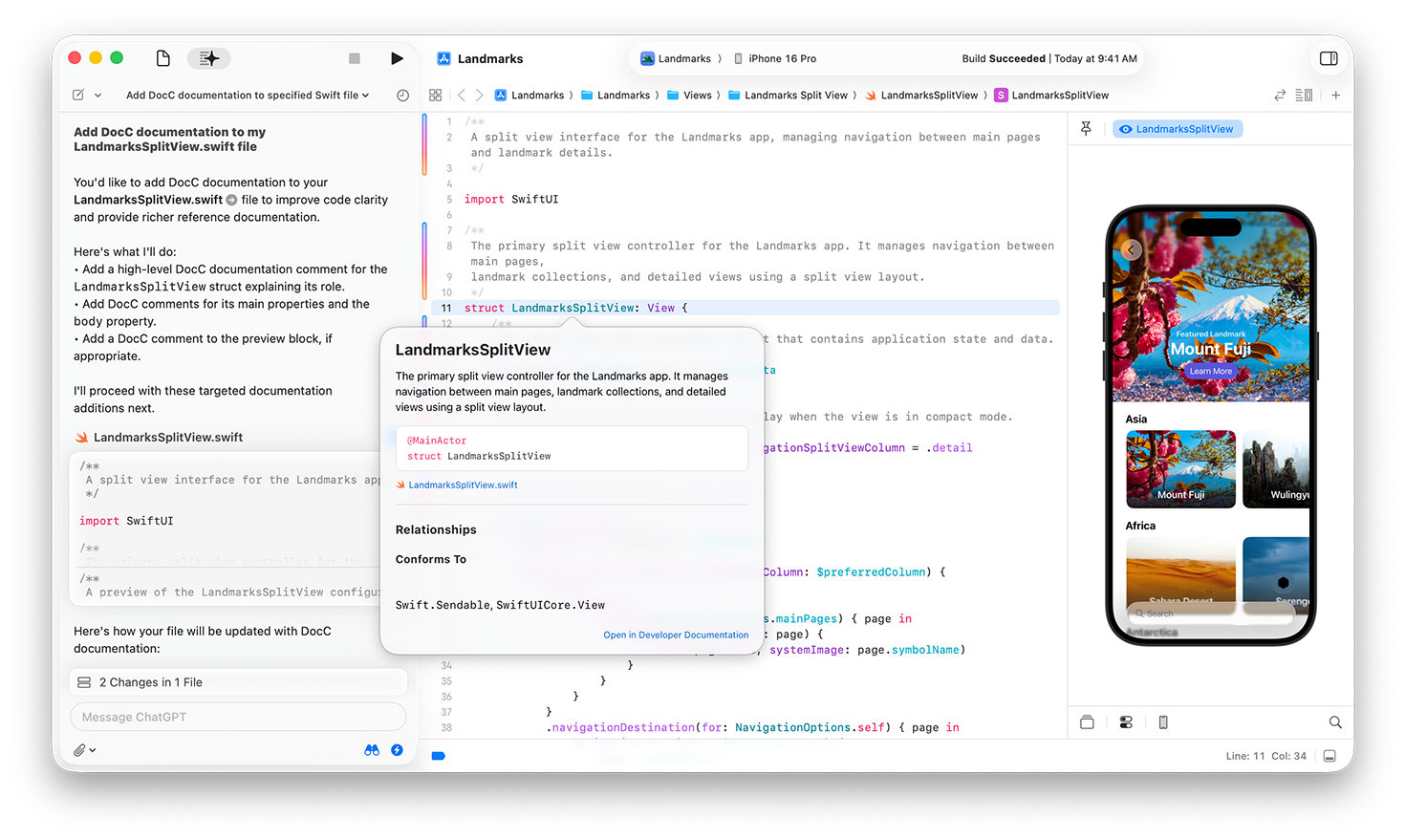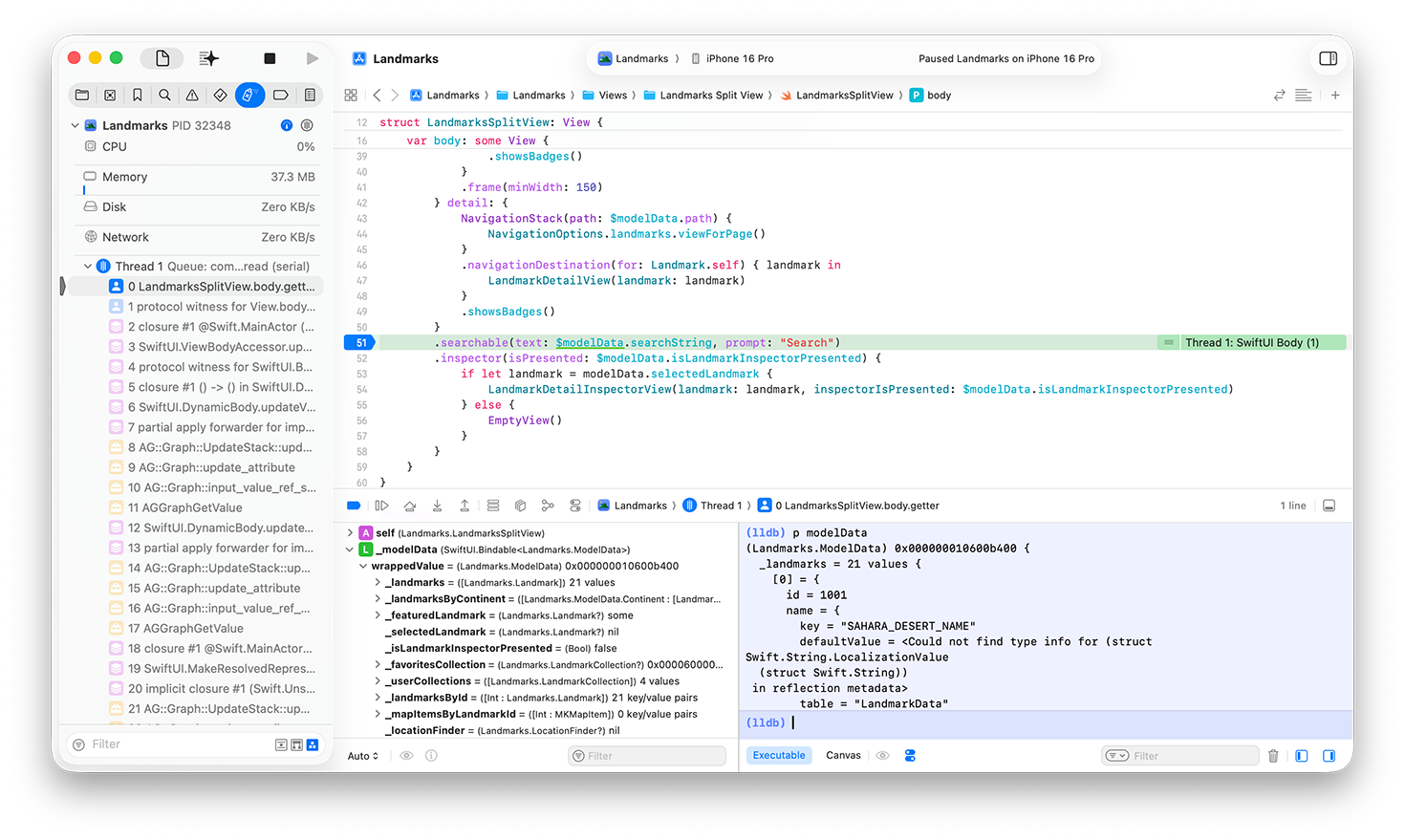As of right now, Apple's AI features in Xcode finally stopped being complete garbage. After Swift Assist turned into that meme where everyone asked "where the fuck is Swift Assist?" at every Apple event for over a year, they actually shipped something that doesn't crash every five minutes. Here's what works, what's still broken, and what you shouldn't waste your time on.
The Current AI Feature Landscape
Apple introduced two distinct AI systems for Xcode:
Predictive Code Completion - Available since Xcode 16 (sometime in 2024), this runs locally on your Mac using some huge-ass machine learning model - like 2GB or whatever - that Apple trained on Swift and their APIs. Only works on Apple Silicon and macOS Sequoia - fuck you if you're still on Intel.
Swift Assist - Originally announced at WWDC 2024 but delayed forever, Swift Assist is supposed to be a cloud-based AI companion that can perform more complex code generation and assistance tasks. Still waiting for it to actually ship in something that doesn't crash every 5 minutes.
The delay was so bad it became a meme - developers kept asking "where the fuck is Swift Assist?" at every Apple event. But honestly, they needed the extra time because the early betas were unusable trash that would crash Xcode just by looking at it wrong.
Predictive Code Completion: The Local AI Model


This is the thing you'll actually use every day (when it works). Instead of basic text matching, Xcode tries to understand what you're doing and suggests Swift code.
How It Actually Works
It knows Swift and Apple's stuff pretty well, though it still suggests deprecated APIs half the time. Runs locally on your Mac, so Apple can't spy on your terrible variable names.
It mostly suggests the same SwiftUI boilerplate you'd copy-paste anyway, with occasional surprises like deprecated APIs from 2019.
Real-World Performance
After using this shit for 8 months on actual projects (including one that made me $50K and another that got rejected by App Review twice), here's what actually works:
- SwiftUI boilerplate that you'd type anyway (saves maybe 30 seconds per view)
- Protocol stubs when you're too lazy to look up the method signatures
- Basic UIKit setup that hasn't changed since iOS 13
- Method chains for Apple APIs (though it suggests deprecated shit half the time)
What's still garbage:
- Anything involving real business logic (suggests
UIWebViewfor a 2024 project - that shit's been deprecated since iOS 12) - Custom algorithms (generates sorting functions that work on arrays of 5 items but die on real data)
- Third-party frameworks (crashes when you have more than 30 Swift files open, which is basically every real project)
- Any architecture pattern that isn't MVC from 2010
System Requirements and Setup
Hardware Requirements:
- Apple silicon Mac (M1, M2, M3, or later)
- 8GB RAM minimum (16GB recommended for larger projects)
- 5GB free disk space for the model
Software Requirements:
- macOS Sequoia (15.0) or later
- Xcode 16.0 or later
Enabling Predictive Completion:
- Open Xcode Preferences → Text Editing
- Enable "Predictive code completion"
- Download the completion model when prompted (2.2GB download)
- Restart Xcode
The model download fails about 40% of the time - I've downloaded this piece of shit 6 times and it worked once. Apple's error messages are about as helpful as a chocolate teapot. You'll spend more time troubleshooting the download than actually using the damn thing, especially when Apple's servers decide to take a nap during every major release.
Xcode 16-something Gotcha: The predictive completion model breaks on projects with more than 50 Swift files or whatever the magic number is. No warning, no error - it just stops suggesting anything useful. Apple acknowledged this in their release notes buried under "Known Issues" months after developers started complaining on the forums. Typical.
Swift Assist: The Cloud-Based AI Companion
While predictive completion handles the basic autocomplete stuff locally, Swift Assist was supposed to be Apple's answer to serious AI coding assistance. The key word is "supposed" - it took them over a year to actually ship it.
Swift Assist is Apple's attempt to compete with GitHub Copilot and similar AI coding assistants. Unlike predictive completion, Swift Assist can understand higher-level requests and generate substantial code blocks.
Core Capabilities
Apple claims Swift Assist can do all this magical stuff: explore frameworks, generate code from descriptions, refactor existing code, debug assistance, and documentation generation. Reality is more disappointing.
Privacy and Security Model
Apple emphasizes that Swift Assist processes requests without storing developer code:
- Code is sent to Apple's servers only for processing the immediate request
- No code is stored on Apple's servers after processing
- Apple will not use developer code to train future models
- All communication happens over encrypted connections
This differentiates it from some competitors that explicitly use user code for model training.
Xcode 26: Apple Finally Pulls Their Head Out of Their Ass
Apple finally realized that forcing developers to use only their shitty AI models was stupid. After a year of complaints about Swift Assist being down more often than it worked, and predictive completion suggesting deprecated APIs from 2019, they caved and opened up Xcode to other AI providers. About fucking time.
The biggest development is supposedly Xcode 26's support for multiple AI models. If this actually ships and works, it transforms Xcode from a single-AI system into a platform supporting various AI providers.
![]()
Supported AI Models
Built-in Integration:
- ChatGPT - Native integration with limited free usage, or connect your ChatGPT Plus account
- Apple's Swift Assist - The original cloud-based model for Swift-specific tasks
Third-Party API Support:
- Claude - If you want to burn API credits on slightly better suggestions
- Local models - Run your own if you hate yourself and have 32GB RAM
- Other shit - Whatever else you can hook up via API
How Multi-Model Support Works
Xcode 26's implementation allows developers to:
- Add multiple providers through Xcode preferences
- Switch between models depending on the task at hand
- Mark favorite models for quick access
- Use different models for different types of requests
In practice, you'll end up using:
- Local completion for the stuff that actually works (basic property declarations)
- ChatGPT when you're stuck and Google isn't helping
- Claude when ChatGPT gives you deprecated APIs from 2018
- Swift Assist never, because it's usually down or suggests garbage


System Requirements for Xcode 26
For ChatGPT Integration:
- Whatever the latest macOS is called - macOS Something (16.0)
- Active internet connection that actually works
- Optional: ChatGPT Plus subscription for unlimited usage (until you hit their "unlimited" limits)
For Local Models:
- 16GB RAM minimum if you hate yourself
- 32GB RAM if you want it to actually work
- More disk space than you think (anywhere from 2-20GB per model)
Comparing Xcode AI to Alternatives
The question many developers ask: should you use Xcode's built-in AI or stick with tools like Cursor or GitHub Copilot?
What Apple Actually Got Right
The only thing Apple actually got right:
- Predictive completion sometimes understands SwiftUI better than the documentation does
- Swift Assist occasionally knows what newer APIs exist (when it's not down)
- At least you don't have to switch tools and confuse yourself more
- Your code stays local with predictive completion, so Apple can't judge your variable names
At least you don't have to switch tools:
- No need to learn another editor just for AI features
- AI suggestions show up where you're already typing
- Works with Xcode's build system (when both decide to work)
- Predictive completion works offline, unlike literally everything else
Limitations Compared to Alternatives
Language Support:
- Focused primarily on Swift and Objective-C
- Limited support for web technologies, Python, or other languages
- Less useful for cross-platform development
Model Variety:
- Until Xcode 26, limited to Apple's models only
- Slower to adopt latest AI model improvements
- Less flexible than editor-agnostic solutions
When to Actually Use Xcode AI
Use Xcode's AI if you:
- Only write iOS apps and don't want to deal with another tool
- Work for a company that's paranoid about sending code to third parties
- Already spend all day in Xcode and switching editors is a pain
- Build simple CRUD apps where the AI's limitations don't matter
Stick with GitHub Copilot or Claude if you:
- Write anything besides Swift (the Xcode AI is completely useless for other languages)
- Need AI that actually understands modern development patterns
- Want suggestions that don't break your build 20% of the time
- Do any backend work (Node, Python, Go - Xcode AI has never heard of these)
The Development Experience Reality
After nearly a year of availability, most developers say it's better than nothing, but that's about it:
What Actually Works:
- SwiftUI view setup (though it still suggests
@ObservedObjectinstead of@StateObjecthalf the time) - Apple API completion (when it doesn't hallucinate deprecated methods)
- Test boilerplate that compiles but doesn't test anything meaningful
- Copy-pasting the same 10 SwiftUI modifiers you use in every project
What Will Actually Piss You Off:
- Download fails repeatedly and Apple's solution is "try again later" (thanks, Tim)
- AI suggests MVC patterns when you're using MVVM because it learned from decade-old tutorials
- Generates code that looks right but breaks at runtime in weird ways
- My 2020 MacBook Air now sounds like a helicopter trying to take off and the battery dies in 2 hours when this shit is running
Most developers I know say the same thing: it's decent for the boring copy-paste shit, but don't trust it with anything that matters. My coworker Mike used it to generate a networking layer for our social app and spent 3 days debugging race conditions that crashed the app whenever someone liked a post too fast. The AI's code looked perfect but created a fucking retain cycle between the URLSession delegate and view controller that held everything in memory until the phone ran out of RAM.
![]()
Looking Ahead: What's Coming
Apple's roadmap for Xcode AI suggests continued expansion:
Short-term (2025):
- Xcode 26 stable release with multi-model support
- Improved local model performance and accuracy
- Additional third-party AI provider integrations
- Better debugging assistance through AI
Medium-term (2026+):
- Integration with Apple Intelligence features
- AI-powered refactoring tools
- Advanced code review and security analysis
- Expanded language support beyond Swift
Apple finally pulled their head out of their ass and realized what we've been bitching about forever: forcing everyone to use one shitty AI model was stupid. Too bad it took them two years to figure this out.
The Reality Check
After two years of dealing with this garbage, here's the honest truth: Xcode AI is decent for the boring shit you'd copy-paste anyway, but don't trust it to architect your app. It's autocomplete that thinks it's a senior engineer. The local predictive completion works when it doesn't crash, Swift Assist is better than nothing when Apple's servers aren't having a meltdown, and the multi-model support in Xcode 26 finally gives you options when Apple's stuff inevitably shits the bed.
Most iOS developers I know use it for generating SwiftUI boilerplate and protocol stubs, then switch to GitHub Copilot or Claude for anything that actually matters. That's probably the smartest approach until Apple figures out how to build AI tools that don't feel like they're held together with duct tape.
If you're masochistic enough to dive deeper into this mess, here are the links that actually matter:
- Xcode 16 Release Notes - Official feature documentation
- Swift Assist Privacy Details - Apple's privacy commitments
- Xcode 26 Multi-Model Guide - Third-party model integration
- Developer Feedback Forum - Community discussions and troubleshooting
- Predictive Completion Setup - Detailed setup guide
- AI Features Analysis - Independent developer review

